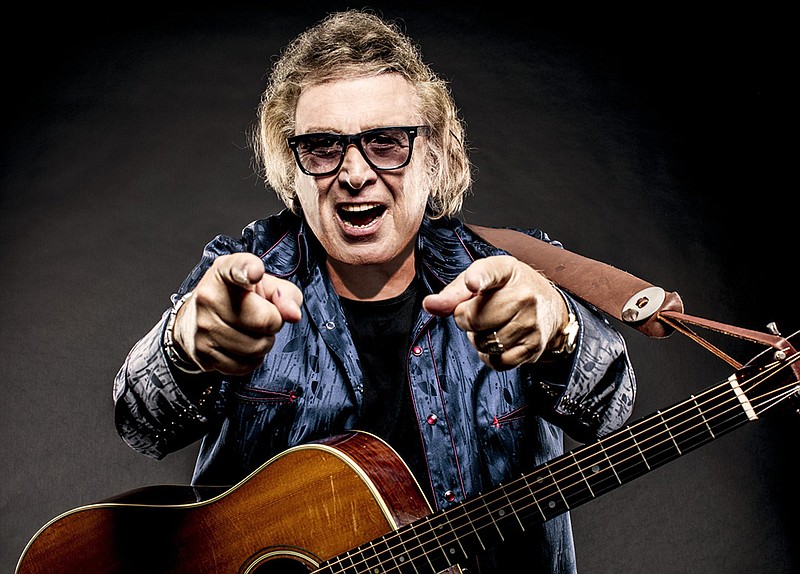Would the man whose 1972 recording of "American Pie" remains an American classic stage a concert and not perform his signature tune?
In the words of Buddy Holly, whose death he immortalizes in the song, "That'll be the day."
So, 84 minutes into his act Saturday night at Oaklawn's events center, Don McLean strummed his guitar to the lyrics that the hundreds present had waited for: "A long, long time ago."
McLean's audience, many of them shaking heads in time with the beat, even if some were surely too young to be around when the song topped the Billboard charts for three weeks, took it from there.
The stage lights came on with each chorus of "Bye, Bye, American Pie," the crowd's cue to burn back the clock when Nixon was in office (well, maybe not that far) and Archie Bunker was on TV.
All four verses (including the optional of "Helter skelter in a summer swelter," sometimes deleted by AM stations) were played with the first verse repeated, McLean sensing that he was working before an especially glib audience. He closed with a Marty Robbins classic, "A White Sport Coat," reminding one long-memoried gent that then-Executive Editor Melinda Gassaway railed at her readers in print over the sparse crowd that Robbins, then with not long to live, who sang "El Paso" and "Devil Woman" among other hits, drew one night at old convention auditorium downtown.
With such as Peter Noone and Herman's Hermits coming to town, Oaklawn is attracting big-name talent, however gray the beards of some audience members be, to its year-old Events Center. This, in fact, proved my first visit to the facility, allowing one to see how Oaklawn could hold something like the Horsemen's and Benevolent Protective Association national convention during the recently concluded live racing season.
(Ever a sports writer, I watched Early Voting win the Preakness on a nearby TV set before entering the auditorium with a friend, mindful that it was trainer Chad Brown's second classic victory and that the first, Cloud Computing in 2017, was sired by, not making this up, MacLean's Music.)
The 76-year-old McLean is on a tour that will soon take him to his home state of New York with appearances in Albany and, at Town Hall, the Big Apple (he being a native of New Rochelle) and to both coasts.
For those not especially hip to rock 'n' roll, a word of introduction about "American Pie."
The artist asks early in the song, "Do you believe in rock and roll?", to which almost anyone present Saturday at Oaklawn would have screamed "yes." "American Pie" charted about the time when America, jaundiced by Vietnam and soon to be bombarded by Watergate, the latter leading to Nixon's 1974 resignation, was about to enter a nostalgia kick. Within two years, your admittedly naive correspondent became interested in Humphrey Bogart movies, developing a lifelong attachment to "Casablanca," and reading Scott Fitzgerald's 1920s classic "The Great Gatsby," to which Francis Ford Coppola whipped out a screenplay for a big-budget flop starring Robert Redford and Mia Farrow.
Thus borne back ceaselessly into the past, listeners flocked to hear McLean's recording, which with total running time of 8:36 encompassing both sides of the single, was then the longest song to reach number one (topping the 7:11 of the Beatles' "Hey Jude"). A Chicago disc jockey unraveled the lyrics, which did not include Holly but referenced the Feb. 3, 1959, plane crash in Iowa that took the lives of Holly, Ritchie Valens and J.P. Richardson, "The Big Bopper." McLean famously called that in song "the day the music died," although any self-respecting Beatles fan would argue for Dec. 8, 1980, when John Winston Ono Lennon's assassination outside his New York brownstone ended speculation about any Fab Four reunion.
Through the years, McLean's fans have thrilled to lyrics about "the jester" (thought to be Bob Dylan) and "the quartet that practiced in the park" (the Beatles). It would be two years before the artist released his second album, "American Pie," which included the stirring "Vincent," a tribute to troubled artist Vincent van Gogh.
McLean's 1969 album "Tapestry," not to be confused with the 1971 Grammy Award-winning disc by Carole King, included "Castles in the Air," a minor hit, and in 1973 "And I Love You So," a No. 1 Adult Contemporary recording for Perry Como and covered by Elvis Presley.
"Vincent" came about halfway through McLean's concert Saturday, prompting the first standing ovation of the evening. One would have liked to hear "Dreidel," a lesser hit from that era, but McLean seemed to know his audience and included standards from Roy Orbison, Elvis, Dwight Yoakam and Johnny Cash that went over well.
Still, the highlight was "American Pie," 50 years later still a mirror to our past. If anything, I would have liked to ask the artist if he could see ahead to the 1982 California-Stanford football game when he penned the line about "the marching band that refused to yield."
